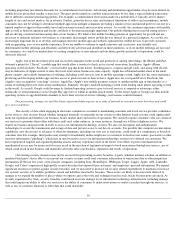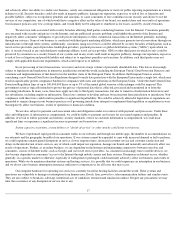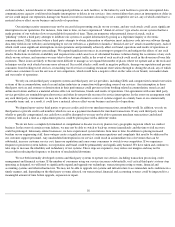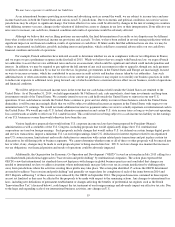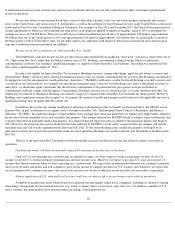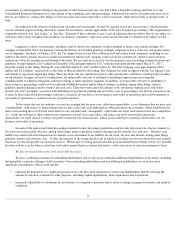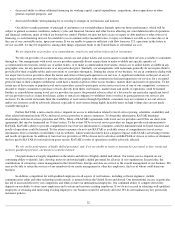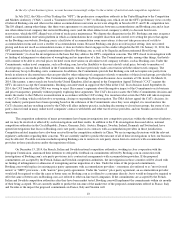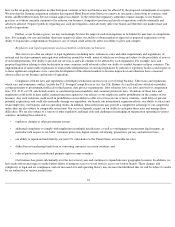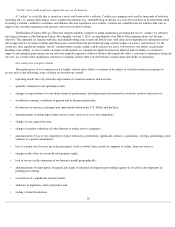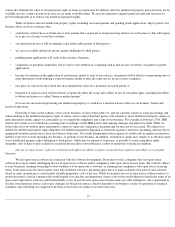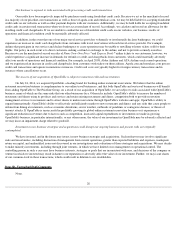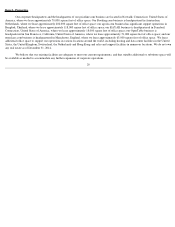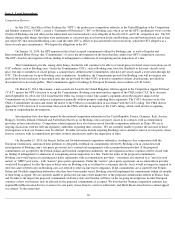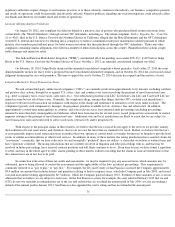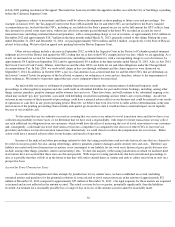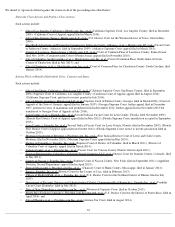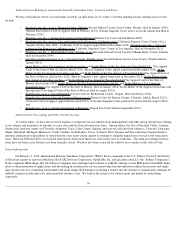Priceline 2014 Annual Report Download - page 30
Download and view the complete annual report
Please find page 30 of the 2014 Priceline annual report below. You can navigate through the pages in the report by either clicking on the pages listed below, or by using the keyword search tool below to find specific information within the annual report.
Sales of a substantial number of shares of our common stock, including through the conversion of our convertible notes, could
adversely affect the market price of our common stock by introducing a large number of sellers to the market. Given the volatility that exists for
our shares, such sales could cause the market price of our common stock to decline significantly. In addition, fluctuations in our stock price and
our price-to-earnings multiple may have made our stock attractive to momentum, hedge or day-trading investors who often shift funds into and
out of stocks rapidly, exacerbating price fluctuations in either direction, particularly when viewed on a quarterly basis.
The trading prices of Internet company stocks in general, including ours, have experienced extreme price and volume fluctuations. To
the extent that the public's perception of the prospects of Internet or e-commerce companies is negative, our stock price could decline, regardless
of our results. Other broad market and industry factors may decrease the market price of our common stock, regardless of our operating
performance. Market fluctuations, as well as general political and economic conditions, such as a recession or interest rate or currency rate
fluctuations, could cause our stock price to decline. Negative market conditions could adversely affect our ability to raise additional capital or the
value of our stock for purposes of acquiring other companies or businesses.
We have, in the past, been a defendant in securities class action litigation. Securities class action litigation has often been brought
against a company following periods of volatility in the market price of its securities. To the extent our stock price declines or is volatile, we may
in the future be the target of additional litigation. This additional litigation could result in substantial costs and divert management's attention and
resources, either of which could adversely affect our business, financial condition and results of operations.
We may not be able to keep up with rapid technological changes.
The markets in which we compete are characterized by rapidly changing technology, evolving industry standards, consolidation,
frequent new service announcements, introductions and enhancements and changing consumer demands. We may not be able to keep up with
these rapid changes. In addition, these market characteristics are heightened by the progress of technology adoption in various markets, including
the continuing adoption of the Internet and online commerce in certain geographies and the emergence and growth of the use of smart phones
and tablets for mobile e-commerce transactions, including through the increasing use of mobile apps. As a result, our future success will depend
on our ability to adapt to rapidly changing technologies, to adapt our services to evolving industry standards and to continually innovate and
improve the performance, features and reliability of our services in response to competitive service offerings and the evolving demands of the
marketplace. In particular, we believe that it will be increasingly important for us to effectively offer our services through mobile applications
and mobile optimized websites on smart phones and tablets. Any failure by us to successfully develop and achieve customer adoption of our
mobile applications and mobile optimized websites would likely have a material and adverse effect on our growth, market share, business and
results of operations. We believe that increasingly ease-of-use, comprehensive functionality and the look and feel of our mobile apps and mobile
optimized websites will be competitively critical as consumers obtain more of their travel and restaurant services through mobile devices. As a
result, we intend to continue to spend significant resources maintaining, developing and enhancing our websites, including our mobile optimized
websites, and our mobile apps and other technology.
In addition, the widespread adoption of new Internet, networking or telecommunications technologies or other technological changes
could require us to incur substantial expenditures to modify or adapt our services or infrastructure to those new technologies, which could
adversely affect our results of operations or financial condition. For example, KAYAK generates revenues, in part, by allowing consumers to
compare search results that appear in additional "pop-under" windows. Changes in browser functionality, such as changes that either block or
otherwise limit the use of "pop-under" windows, at times has had a negative impact on our revenues. Any failure to implement or adapt to new
technologies in a timely manner or at all could adversely affect our ability to compete, increase our customer acquisition costs or otherwise
adversely affect our business, and therefore adversely affect our brand, market share and results of operations.
We face risks related to our intellectual property.
We regard our intellectual property as critical to our success, and we rely on domain name, trademark, copyright and patent law, trade
secret protection and confidentiality and/or license agreements with our employees, travel service providers, partners and others to protect our
proprietary rights. We have filed various applications for protection of certain aspects of our intellectual property in the United States and other
jurisdictions, and we currently hold a number of issued patents in multiple jurisdictions. Further, in the future we may acquire additional patents
or patent portfolios, which could require significant cash expenditures. However, we may choose not to patent or otherwise register some of our
intellectual property and instead rely on trade secret or other means of protecting our intellectual property. We have licensed in the past, and may
license in the future, certain of our proprietary rights, such as trademarks or copyrighted material, to third parties, and these licensees may take
26


